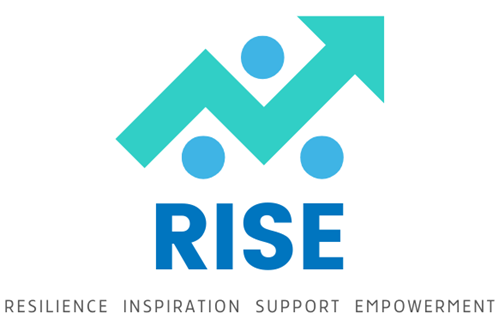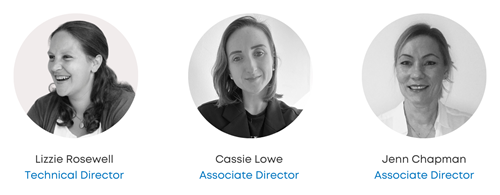RISE Up: How a new group within Henry Riley is supporting women throughout the organisation
At the end of 2023, women made up 15.8% of the construction industry workforce according to the Office for National Statistics (ONS), which is the highest it has ever been since records began at the end of the 1990s.
But there is still work to be done around recruiting and retaining women into the sector. As a result, Technical Director, Lizzie Rosewell, who works out of Henry Riley’s Leicester office, has created RISE, a women in leadership group that brings together women leaders at associate director level and above within Henry Riley and DGA.
RISE stands for Resilience, Inspiration, Support and Empowerment and the name came about as a result of a collaboration within the group. “We liked the idea of rising up and promoting women into senior roles,” says Rosewell. “The R stands for resilience which gets to the heart of what we’re trying to achieve.”

A forward-thinking company
Progressive initiatives are not new for Henry Riley. As part of the company’s Values, it’s committed to ‘providing a healthy, safe, inclusive and creative working environment that respects equality and diversity and that supports people in reaching their ambitions and goals.’ Some of these initiatives include:
- Inspiring the Future where team members visit local schools to try and change the perception of the construction industry and show the broad types of jobs that are available.
- The Henry Awards, awarded for exceptional work in accordance with Henry Riley’s Values, has anonymised its nominees, so unconscious bias is removed and awards are won purely on achievement.
- Executive directors have all taken part in an Unconscious Bias workshop run by Full Potential, which is key for achieving a diverse workplace. There have also been additional workshops for managers and team members who are influential in the recruitment of employees.
- In 2024, for the first time, there was a target for a 50/50 short list for apprenticeship places, so there is more of a level playing field when it comes to recruiting. The emphasis that has been placed on diversifying the shortlists for Early Career roles has so far been successful.
- Henry Riley has increased the number of women in the organisation by 63% in the last five years, and women now make up 28% of the workforce, which is nearly double the national average. And of the 29 new employees, recruited in 2023, 25% were women.
- Henry Riley also reports the gender pay gap internally, although with under 250 employees it is not legally obligated to so and does so voluntarily.
On the rise
We spoke to Lizzie Rosewell as well two other members of RISE, Cassie Lowe, Associate Director project management from the Bolton office and Jennifer Chapman, Associate Director and Data Sub Sector Head based in London, to talk about their experiences working in the construction industry, how things have changed since they started out and what RISE has achieved so far.
All three women are enjoying long and successful careers within Henry Riley but naturally have some tales to tell. “The difficulty is you’re outnumbered,” says Lowe “and you’re usually the only woman round the table.” Rosewell agrees. “Yes, being the only woman in the room is a regular occurrence. The culture has improved since I first started, and everyone is more respectful now. But it’s still a male dominated environment and there’s a sense of having to prove who you are each time, even as a senior person.”
Chapman has worked in the sector for 25 years and recalls how when she first applied for a job with a construction company, her CV was tossed in the bin and she was refused an interview. However, the wife of the owner insisted they speak to her. “I turned up to the interview,” says Chapman “and the men crossed their arms and sat back uninterested. Long story short, 40 mins later I walked out of the room with a job offer. I worked there for over three years!” She must have seen huge strides forward in the last two decades? “When I was younger, I wasn’t listened to, I wasn’t invited to meetings, and I lost count of the times I was asked to make the tea and coffee and take notes. As Lizzie says, there has been huge advancements in the perception of women in the industry and in general the industry is in a better place than it has been.”
Recruit and retain
So if the industry is moving forward, why the need for RISE? “We know there’s a goal to have women make up 25% of the leadership team at Henry Riley by 2025, and that’s a great intention,” says Rosewell. “But we need concrete actions to make it happen. There needs to be peer to peer support for women early on in their careers as well as at a senior level to ensure retention.” As Rosewell points out, research shows that men working in surveying have an average career of 28 years, while it’s just 16 for women.
While there had been conversations previously about having a group within Henry Riley to help retain talented women, to encourage communication between all women in the business, and recruit more women into the industry, it was Rosewell that started the ball rolling in September 2023. “We have had the idea in our heads for a while about having something like RISE,” says Rosewell. “Yes, we’ve all been saying it would be great to have a space for women to meet, to support, to mentor and encourage,” adds Chapman. “It took Lizzie to make it happen.”
The power of diverse workspaces
There are of course, huge benefits to having more women working in the sector. As Henry Riley CEO David Needham says, “diverse teams simply perform better.” Does Rosewell agree? “Absolutely. More diverse teams have more diverse thoughts, and all the research shows that performance is improved with diverse teams. Plus, the built environment is about addressing the needs of society. And that’s more likely if you have that society represented in your teams.”
“Having more women helps the industry drive towards a more nonbiased workplace, with less macho attitudes,” adds Chapman. “We think differently and solve problems differently. And we can come at a solution from a different angle.” Lowe agrees. “With women at the table, conversations have a different tone, and they bring something different to the proceedings.”
And there are some areas of the construction sector that are particularly suited to women according to Lowe. “Project management is a route into the industry and women often have a good skills around organisation and comms which really suit PM roles.” “It’s important to highlight that being in construction is not just hard hats and kicking dirt on site!” adds Chapman. “There are so many different roles, and so many ways women can be part of the industry.”
Key areas of focus
Face to face meetings take place every three months with online catch ups as and when needed. The first meeting took place in September 2023. What was discussed and what has been achieved to date? “Nothing was off the table,” says Lowe. “David Needham attended our first meeting and was fully supportive of the initiative. He said: ‘let us know your ideas’ and was excited to see what we came up with.”
During the first meeting, and after much discussion, three areas were prioritised: PPE, flexible working and networking opportunities.
Any female member of staff venturing on to a site will confirm there have been issues with poorly fitting PPE for years, including man sized boots. “There are real concerns around safety when you’re climbing a ladder and the boots are too big for you,” says Rosewell. And, of course, it’s hard to appear professional when you’re swamped by a jacket three sizes too big. Already, a supplier of female-specific kit has been secured and products are currently being tested. “Properly fitting kit will be rolled out to female staff in due course,” says Rosewell.
As for flexible working, Henry Riley already has a flexible working policy in place and provides hybrid working as standard practice. So what more does RISE want to achieve? “Being able to balance family life with flexible working hours, is key to retaining female talent,” says Rosewell. “And we want to make it easier to have those conversations,” adds Lowe. “Yes, we’re a family friendly business. But I still felt worried about asking for part-time hours after I had my little boy. We want to make sure that younger female colleagues and women joining the company will find that much easier, and that nothing is off the table in terms of flexible working.” Lowe worked three days a week after coming back from maternity leave before increasing her working week to four days. “I now take Fridays off as it tends to be quieter day in the industry anyway. My clients and my colleagues completely respect my day away from the office and it works well.” Rosewell agrees. “We want to focus on the fact that flexible working is the norm and we want to publicise that fact company-wide so staff members are not discouraged from asking.” “Exactly,” adds Chapman. ‘We want consistency at every level so the default response to requests for flexible working is ‘yes, absolutely, let’s see how we can make this work.’”
And lastly, issues around networking, business development and corporate hospitality need to be tackled. “So many construction industry events end up involving beer drinking or sports like football or golf,” says Rosewell. “We know there are women who like sport. But we want to diversify when it comes to networking and entertaining.” As a result, there’s a commitment to organising less sports-related events. “It would be great to have a few nights out at the theatre,” adds Lowe. Plus female members of the senior management team now have membership to specific networking groups including Women in Property.
Positive influence
So has RISE been received positively across the company? “The board have been incredibly supportive” says Rosewell. “It’s opened up conversations in the office with male colleagues too, which is great.” “It’s an incredible support group and a safe place to speak without fear of retribution,” adds Chapman. “But it’s also important that younger women in Henry Riley know they can come and speak to us about their concerns without it affecting their career even on an unconscious level.” And as Lowe points out, support for women is throughout the organisation. “It’s good for our female colleagues in business support roles to see that they have the potential to move into technical client facing roles too and will receive the support to do so. We want to keep talented women in the company. So RISE isn’t just for the senior team, it’s for all our female colleagues across the business.”
Future of the sector
What does the future hold? Attracting more women into the business and keeping and promoting them into senior positions won’t happen overnight, of course. But initiatives like RISE will certainly help.
“When I did my Uni degree over a decade ago there were about 100 on the course and only five women,” says Lowe. “But we were interviewing recently and 30% of the candidates were female, with two receiving offers, which is a good sign.” Rosewell agrees. “Yes, there are more women coming into sector in the past decade and the culture and attitudes have got better. But more progress is needed.” What does Chapman think the future looks like? “I think more women will be joining our industry and there will be more inclusivity right across the board. Women in construction won’t even be an issue that needs to be discussed. it will just be the norm.”
